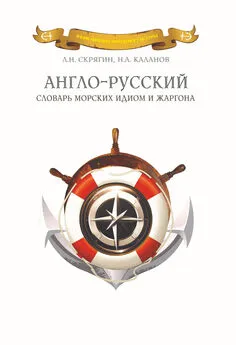Adam Makkai - Словарь американских идиом: 8000 единиц
- Название:Словарь американских идиом: 8000 единиц
- Автор:
- Жанр:
- Издательство:неизвестно
- Год:неизвестен
- ISBN:нет данных
- Рейтинг:
- Избранное:Добавить в избранное
-
Отзывы:
-
Ваша оценка:
Adam Makkai - Словарь американских идиом: 8000 единиц краткое содержание
Это обновленное и дополненное издание, содержащее более 8000 идиоматических
слов и выражений, причем каждое из которых снабжено грамматическим объяснением
и практическим примером. Словарь содержит лексемные идиомы, фразеологические
единицы и поговорки, имеющие особенное значение. В нем приведены наиболее
употребительные выражения только американского английского языка. Этот словарь — идеальное пособие для студентов, часто разъезжающих бизнесменов и просто
путешественников.
Словарь американских идиом: 8000 единиц - читать онлайн бесплатно полную версию (весь текст целиком)
Интервал:
Закладка:
[make ends meet] {v. phr.} To have enough money to pay one’s bills; earn what it costs to live. •/ Both husband and wife had to work to make ends meet. /
[make eyes at] {v. phr.} , {informal} To look at a girl or boy in a way that tries to attract him to you; flirt. •/ The other girls disliked her way of making eyes at their boyfriends instead of finding one of her own. /
[make faces at] {v. phr.} To grimace; scowl. •/ "Stop making faces at each other, you children," my aunt said, "and start eating." /
[make for] {v.} To go toward; start in the direction of. •/ The children took their ice skates and made for the frozen pond. / •/ The bee got his load of pollen and made for the hive. /
[make free with] {v.} 1. To take or use (things) without asking. •/ Bob makes free with his roommate’s clothes. / •/ A student should not make free with his teacher’s first name. / 2. To act toward (someone) in a rude or impolite way. •/ The girls don’t like Ted because he makes free with them. / Compare: TAKE LIBERTIES.
[make friends] {v. phr.} To become friends; form a friendship. •/ Mrs. Jones invited Bobby to her home to play with Don. She hoped that they would make friends with each other. / •/ You can make friends with an elephant by giving him peanuts. /
[make fun of]or [poke fun at] {v. phr.} , {informal} To joke about; laugh at; tease; mock. •/ Men like to make fun of the trimmings on women’s hats. / •/ James poked fun at the new pupil because her speech was not like the other pupils. /
[make good] {v. phr.} 1. To do what one promised to do; make something come true. •/ Mr. Smith borrowed some money. He promised to pay it back on payday. He made good his promise. / •/ Joe made good his boast to swim across the lake. / •/ John’s mother promised to take him and his friends to the zoo on Saturday. She made good her promise. / Compare: CARRY OUT. 2. To compensate; pay for loss or damage. •/ The policeman told the boy’s parents that the boy must make good the money he had stolen or go to jail. / — Often used in the phrase "make it good". •/ The radio was broken while it was being delivered so the store had to make it good and send us a new radio. / Compare: MAKE UP. 3. To do good work at one’s job; succeed. •/ Kate wanted to be a nurse. She studied and worked hard in school. Then she got a job in the hospital and made good as a nurse. /
[make good time] {v. phr.} To make unimpeded progress on a journey; arrive at one’s destination sooner than estimated. •/ There was not much traffic on the expressway so we made good time on our way to the airport. /
[make haste] {v. phr.} To move fast; hurry. — Rarely used in speaking. •/ The dog wriggled into one end of the hollow log, and the rabbit made haste to get out the other end. / •/ Mary saw that she had hurt Jane’s feelings, and made haste to say she was sorry. / Compare: MAKE TRACKS.
[make haste with]See: HURRY ON WITH.
[make hay while the sun shines] {v. phr.} To do something at the right time; not wait too long. •/ Dick had a free hour so he made hay while the sun shone and got his lesson for the next day. / Compare: MAKE THE MOST OF.
[make head or tail of] {v. phr.} , {informal} To see the why of; finding a meaning in; understand. — Used in negative, conditional, and interrogative sentences. •/ She could not make head or tail of the directions on the dress pattern. / •/ Can you make head or tail of the letter? /
[make headway] {v. phr.} To move forward; make progress. •/ The university is making headway with its campus reorganization project. /
[make it hot] {v. phr.} , {informal} To bring punishment; cause trouble. •/ Dick threatened to make it hot for anyone who tied knots in his pajama legs again. /
[make it snappy] {v. phr.} , {informal} To move quickly; be fast; hurry. — Usually used as a command. •/ "Make it snappy," Mother said, "or we’ll be late for the movie." / •/ The man hurried into the restaurant and told the waitress, "A cup of coffee, and make it snappy." /
[make it with] {v. phr.} , {slang} , {informal} 1. To be accepted by a group. •/ Joe finally made it with the in crowd in Hollywood. / 2. {vulgar} To have sex with (someone). •/ I wonder if Joe has made it with Sue. /
[make light of] {v. phr.} To treat an important matter as if it were trivial. •/ One ought to know which problems to make light of and which ones to handle seriously. / Compare: LAUGH OFF. Contrast: MAKE MUCH OF.
[make little of] {v. phr.} To make (something) seem unimportant; belittle. •/ Mary made little of Jane’s new bicycle because she was jealous. / •/ Tom made little of his saving the drowning boy. / Contrast: MAKE MUCH OF.
[make love] {v. phr.} 1. To be warm, loving, and tender toward someone of the opposite sex; try to get him or her to love you too. •/ There was moonlight on the roses and he made love to her in the porch swing. / 2. To have sexual relations with (someone). •/ It is rumored that Alfred makes love to every girl he hires as a secretary. /
[make merry] {v. phr.} , {literary} To have fun, laugh, and be happy, •/ In Aesop’s fable the grasshopper made merry while the ant worked and saved up food. / •/ In the Bible story a rich man ate and drank and made merry. /
[make mincemeat (out) of] {v. phr.} To destroy completely. •/ The defense attorney made mincemeat of the prosecution’s argument. /
[make much of] {v. phr.} To make something seem of more worth or importance than it really is; praise. •/ Visitors made much of the new collie. / •/ The boy made much of the hard things of his mountain climb. / Contrast: MAKE LIGHT OF, MAKE LITTLE OF.
[make neither head nor tail of] {v. phr.} To be unable to figure something out. •/ This puzzle is so complicated that I can make neither head nor tail of it. / Compare: HEADS OR TAILS.
[make no bones] {v. phr.} , {informal} 1. To have no doubts; not to worry about right or wrong; not to be against. — Used with "about". •/ Bill makes no bones about telling a lie to escape punishment. / •/ The boss made no bones about hiring extra help for the holidays. / 2. To make no secret; not keep from talking; admit. — Used with "about" or "of the fact". •/ John thinks being poor is no disgrace and he makes no bones of the fact. / •/ Mary made no bones about her love of poetry even after some of her friends laughed at her. /
[make of] {v. phr.} To interpret; understand. •/ What do you make of his sudden decision to go to Africa? /
[make off] {v.} To go away; run away; leave. •/ When the deer saw the hunter it made off at once. / •/ A thief stopped John on a dark street and made off with his wallet. / Compare: TAKE OFF.
[make one feel at home] {v. phr.} To be hospitable; welcome; make someone feel at ease. •/ They are very popular hosts because they always manage to make their guests feel at home. /
[make one out to be] {v. phr.} To accuse someone of being something. •/ Don’t make me out to be such a grouch; I am really quite happy-go-lucky. /
[make one’s bed and lie in it]To be responsible for what you have done and so to have to accept the bad results. •/ Billy smoked one of his father’s cigars and now he is sick. He made his bed, now let him lie in it. / Compare: FACE THE MUSIC(2).
[make one’s blood boil]or [make the blood boil] {v. phr.} , {informal} To make someone very angry. •/ When someone calls me a liar it makes my blood boil. / •/ It made Mary’s blood boil to see the children make fun of the crippled girl. / Compare: BOILING POINT.
[make one’s blood run cold]See: BLOOD RUNS COLD.
[make one’s ears burn]See: EARS BURN.
[make oneself at home] {v. phr.} To feel comfortable; act as if you were in your own home. •/ If you get to my house before I do, help yourself to a drink and make yourself at home. / •/ John was an outdoor man and could make himself at home in the woods at night. / Compare: AT EASE, AT HOME(2).
[make oneself scarce] {v. phr.} , {slang} To leave quickly; go away. •/ The boys made themselves scarce when they saw the principal coming to stop their noise. / •/ A wise mouse makes himself scarce when a cat is nearby. /
[make one’s hair stand on end]See: HAIR STAND ON END.
[make one’s head spin] {v. phr.} To be bewildered; be confused. •/ It makes my head spin to think about the amount of work I still have to do. /
[make one’s mark] {v. phr.} To become known to many people; do well the work you started to do; make a reputation. •/ Shakespeare made his mark as a playwright. /
[make one’s mouth water] {v. phr.} 1. To look or smell very good; make you want very much to eat or drink something you see or smell. •/ The pies in the store window made Dan’s mouth water. / •/ The picture of the ice cream soda made his mouth water. / 2. To be attractive; make you want to have something very much. •/ Judy collects folk song records, and the records in the store window made her mouth water. / Compare: LICK ONE’S CHOPS.
[make one’s pile] {v. phr.} To make one’s fortune. •/ The rich man made his pile in the stock market. /
[make one’s way] {v. phr.} 1. To go forward with difficulty; find a path for yourself. •/ They made their way through the crowd. / 2. To do many hard things to earn a living; make a life work for yourself. •/ He was anxious to finish school and make his own way in the world. / Compare: SHIFT FOR ONESELF.
[make one tick] {v. phr.} To cause to operate; to motivate. •/ He is so secretive that we are unable to figure out what makes him tick. /
[make or break] {v. phr.} To bring complete success or failure, victory or defeat. •/ Playing the role of Hamlet will make or break the young actor. /
[make out] {v.} 1. To write the facts asked for (as in an application blank or a report form); fill out. •/ The teacher made out the report cards and gave them to the students to take home. / •/ Mrs. Smith gave the clerk in the store some money and the clerk made out a receipt. / 2. To see, hear, or understand by trying hard. •/ It was dark, and we could not make out who was coming along the road. / •/ They could not make out what the child had drawn. /•/ The book had many hard words and Anne could not make out what the writer meant. / •/ Mr. White does many strange things. No one can make him out. / Syn.: FIGURE OUT. 3. {informal} To make someone believe; show; prove. •/ Charles and Bob had a fight, and Charles tried to make out that Bob started it. / •/ The boy said he did not take the money but the teacher found the money in the boy’s desk and it made him out to be a liar. / 4. {informal} Do well enough; succeed. •/ John’s father wanted John to do well in school and asked the teacher how John was making out. / •/ The sick woman could not make out alone in her house, so her friend came and helped her. / 5. To kiss or pet. •/ What are Jack and Jill up to? — They’re making out on the back porch. /
Читать дальшеИнтервал:
Закладка:







